‘US government documents admit that the atomic bombing of Hiroshima and Nagasaki was not necessary to end WWII. Japan was on the verge of surrendering. The nuclear attack was the first strike in Washington’s Cold War on the Soviet Union. Ben Norton reviews the historical record.’



Not much since there’d be quite few of them. Japan would be on the retreat at that point and would have very limited capacity to carry out further atrocities.
What would you tell people that lost their families in the Korean war to support the atomic bombs, since Japan surrendering to the US instead of the USSR all but guaranteed that war?
Japan already knew they had lost and were trying to surrender at that point.
“A limited capacity.” Or, they might have decided that if they were going to lose, they would take as many people as they could with them.
Read up on biological warfare Unit 731 and tell me that there was no chance they’d have killed as many people as they could.
https://en.wikipedia.org/wiki/Unit_731
Fascists are often cowards, I’m not saying they wouldn;t callously kill people during their retreat, rather that atrocities take planning and coordination, ergo time, time they wouldn’t have if they wanted to flee and they would have,
If your logic held up there’d be little stopping them from committing these light-speed atrocoties between the second bomb and the surrender.
Plus, if they really wanted to go out in a blaze-of-glory Goetterdaemmerung situation, why would the atomic bombs have made any difference whatsoever? The argument seems to be “the Japanese government wanted to kill Japanese civilians, and the only way we Americans could stop them was by… killing Japanese civilians.”
See also: Iraq, Afghanistan, Vietnam, Korea etc.
https://en.wikipedia.org/wiki/Unit_731#Surrender_and_immunity
Curious.
Interesting.
It just keeps going.
So glad US nuked civilians so they could have sole occupation of Japan.